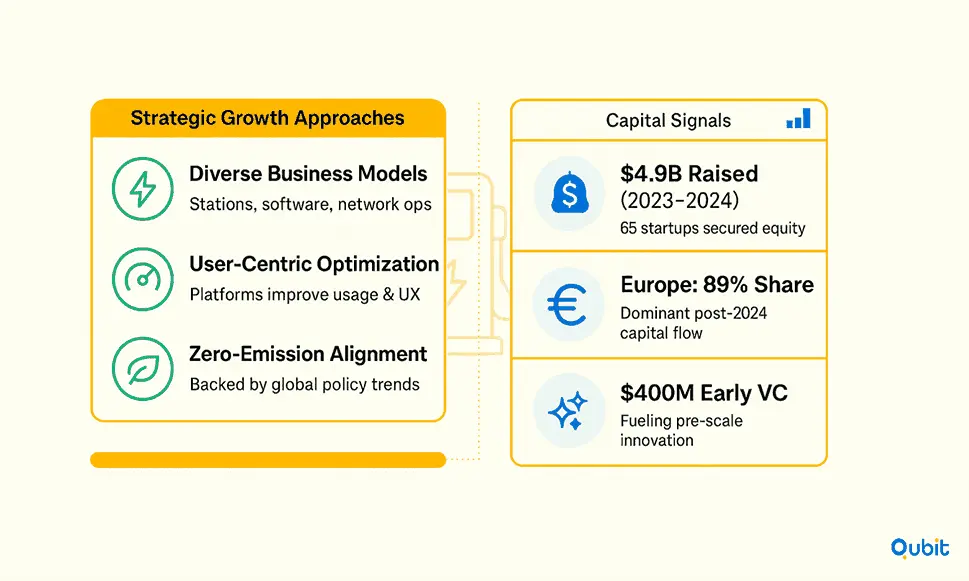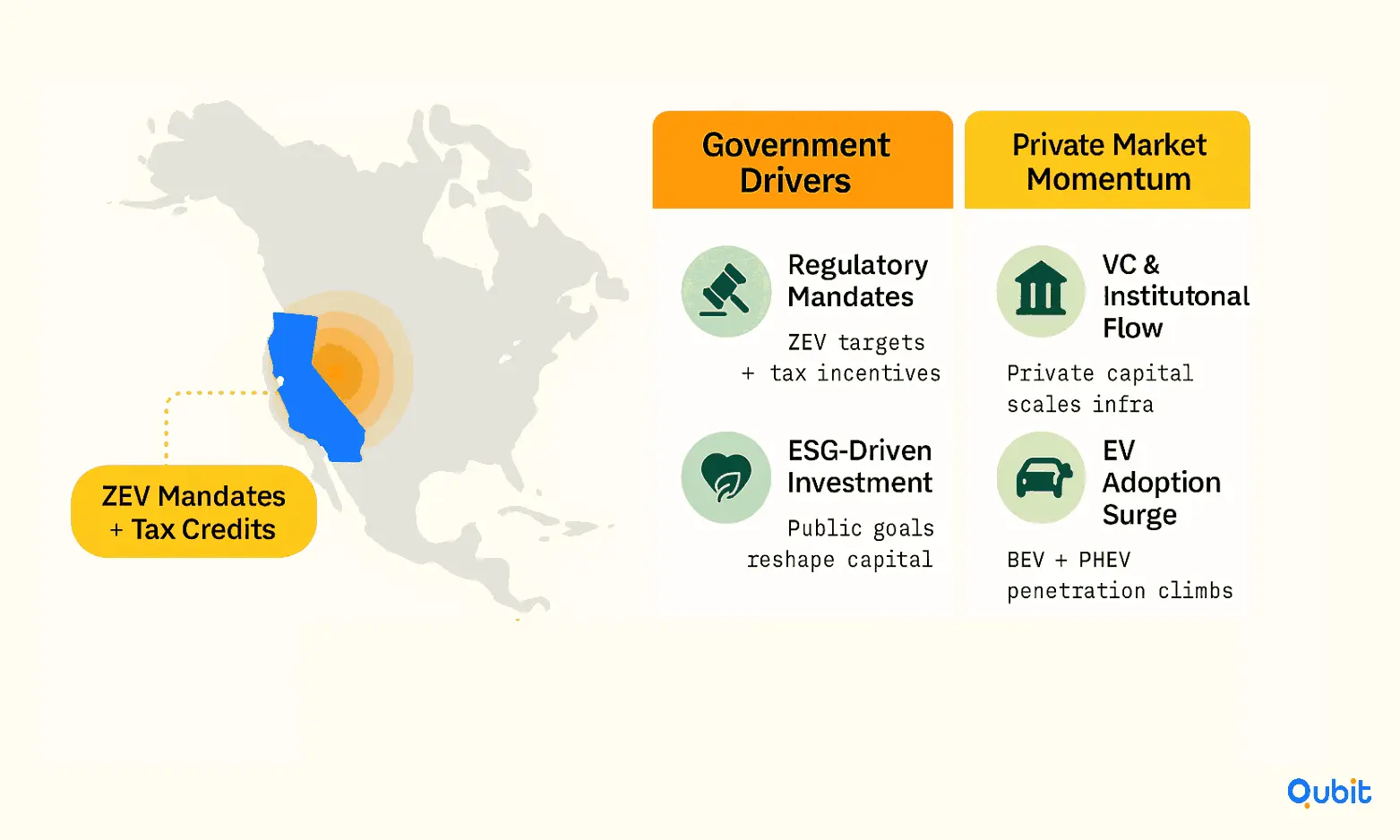The electric vehicle (EV) revolution is accelerating, and with it comes an urgent need for accessible charging infrastructure. This demand has sparked a surge of interest in EV charging startups, making them a focal point for investor activity.
Investors are drawn to the potential of these startups to address critical gaps in charging availability, technology innovation, and scalability. For a broader perspective on financing approaches applicable to mobility ventures, refer to mobility startup fundraising strategies.
Let’s dive deeper into why this vertical continues to attract substantial funding and explore the trends shaping its future.
Strategy to Excel: Gaining a Competitive Edge in EV Charging Startups
Electric vehicle (EV) charging startups are redefining mobility by embracing diverse business models and tapping into robust global capital flows. As the world accelerates toward zero-emission transportation, these startups are carving out competitive advantages through innovation and strategic funding.

Diverse Business Models Driving Growth
EV charging startups are exploring multiple avenues to establish their presence in the market. From station installation to network operation and software development, these companies are creating tailored solutions to meet the growing demand for EV infrastructure. For instance, some startups focus on building expansive charging networks, while others specialize in software platforms that optimize station usage and enhance customer experience. This diversification not only addresses varied consumer needs but also strengthens their market positioning.
Funding Milestones and Global Trends
The financial landscape for EV charging startups has witnessed remarkable growth. According to Crunchbase’s data, $4.9 billion in total equity funding has been raised across 65 private companies between 2023 and 2024. European startups have emerged as frontrunners, capturing 89% of post-2024 funding, while early-stage venture capitalists contributed over USD 400 million to fuel innovation. These investments are driven by the global transition to EV infrastructure, which aligns with climate goals and the shift away from fossil-fuel vehicles.
The Push for Zero-Emission Mobility
The worldwide move toward zero-emission mobility is a key driver of investor interest in EV charging startups. As governments and industries prioritize sustainability, the demand for reliable and accessible charging solutions continues to grow. This trend underscores the importance of innovative service models and strategic funding in enabling startups to thrive in this competitive sector.
Your review of funding strategies gains additional nuance from the mobility startup investor due diligence checklist, which elaborates on the financial, legal, and regulatory aspects considered during investor assessments.
By combining diverse business models with significant funding opportunities, EV charging startups are well-positioned to lead the charge in zero-emission mobility.
Evaluating Capital Investment Trends in EV Charging Startups
The electric vehicle (EV) charging sector has become a magnet for investors, with significant capital flowing into startups that promise to shape the future of sustainable mobility. Top-funded companies are channeling resources into building and operating EV charging networks, a critical infrastructure for the growing EV market. This trend underscores the strong investor interest in EV charging startups, as they position themselves to meet the surging demand for accessible and efficient charging solutions.
Major Funding Milestones
One standout example is Paris-based Electra, which recently secured $330 million in Series B funding. This milestone brings its total funding to an impressive $550 million, solidifying its position as a leader in the European EV charging market. Electra’s business model, which focuses on high-speed charging stations and seamless user experiences, exemplifies how large-scale capital investments are driving innovation in the sector. For a deeper dive into this success story, explore Electra’s Funding Journey, which highlights its strategic approach to scaling operations.
Charge Point Operators (CPOs) are also emerging as a primary focus for investors. With U.S. market projections estimating the EV charging industry to reach $100 billion by 2040, the potential for growth is immense. CPOs are not only expanding their networks but also integrating advanced technologies such as smart charging and energy management systems, making them attractive targets for strategic investments.
Strategic Investment Patterns
The allocation of capital in this sector reveals a clear preference for startups that combine scalability with technological innovation. Investors are particularly drawn to companies that can demonstrate a sustainable competitive advantage, whether through proprietary technology, strategic partnerships, or operational efficiency. This focus ensures that funding is directed toward ventures capable of addressing long-term challenges in EV infrastructure development.
Your understanding of startup financing evolves further with the insights provided by equity dilution mobility startup, offering a detailed exploration of dilution norms and negotiation approaches within EV charging funding rounds.
As the EV charging market continues to grow, the strategic deployment of capital will play a pivotal role in shaping its trajectory. By examining case studies like Electra and analyzing broader investment trends, stakeholders can gain valuable insights into the dynamics driving this rapidly evolving industry.
Seed and Early-stage Investment Opportunities in EV Charging
Seed and Series A investments are increasingly targeting niche segments within the EV charging ecosystem. Investors are drawn to startups that address specific urban challenges, such as retrofitting existing infrastructure or providing tailored solutions for underserved markets. This focus on localized pain points has led to the emergence of innovative companies like Voltpost, Orange Charger, and ChargeLab.
Startups like Voltpost, for instance, are pioneering solutions by transforming lampposts into EV charging stations. This approach not only optimizes existing urban infrastructure but also minimizes the need for costly new installations. Highlighting Voltpost’s innovative model demonstrates how niche-focused seed investments can drive scalable solutions in EV charging infrastructure. Similarly, Orange Charger is addressing the unique needs of apartment complexes, where shared parking spaces often lack accessible charging options. Their tailored approach ensures that multi-unit dwellings are no longer left behind in the EV transition.
ChargeLab, on the other hand, is leveraging software to streamline the management of EV charging networks. By focusing on interoperability and user-friendly platforms, they are solving operational inefficiencies that hinder widespread adoption. These startups exemplify how early-stage funding is fueling advancements in targeted EV charging solutions.
For investors, the appeal lies in the scalability of these niche solutions. By addressing specific, localized challenges, these companies are not only meeting immediate market needs but also positioning themselves for long-term growth as EV adoption accelerates globally.
Assessing Public Market Performance of EV Charging Providers
Publicly listed EV charging companies are facing a turbulent period in the stock market, marked by notable declines in share prices. These fluctuations have sparked critiques regarding the sector's ability to deliver consistent returns. However, the broader picture reveals a promising trajectory for long-term investor confidence.
Despite short-term volatility, infrastructure expansion remains a key driver of optimism. The addition of 1.3 million public charging points globally in 2024 underscores the industry's commitment to growth, even amid market challenges. This statistic highlights the sector's resilience and its ability to attract sustained investor interest.
The stock market performance of EV charging providers reflects the growing pains of an industry still in its formative stages. While temporary setbacks may deter some investors, the underlying demand for EV infrastructure continues to rise. This demand is fueled by global efforts to transition to cleaner energy solutions, positioning EV charging startups as pivotal players in the green economy.
For investors, the current landscape offers a mix of challenges and opportunities. The short-term market critiques are balanced by the long-term potential of a sector that is expanding rapidly. As infrastructure growth accelerates, the alignment between public market performance and investor interest in EV charging startups is expected to strengthen.
This dynamic interplay between market volatility and infrastructure expansion highlights the importance of a forward-looking approach for stakeholders. By focusing on the industry's long-term potential, investors can better navigate the complexities of the EV charging sector and capitalize on its growth trajectory.
Crunchbase Pro Lists: A Strategic Tool for EV Charging Startup Insights
Crunchbase Pro lists offer a streamlined approach to uncovering key trends among EV charging startups. With access to curated data, users can quickly identify which companies are attracting significant investor interest, a critical metric for understanding market dynamics.
These lists provide comprehensive information, spanning high-growth ventures to early-stage startups. By analyzing funding histories and valuations, stakeholders can benchmark established market leaders against emerging competitors. For instance, the Crunchbase EV Charging Startups List aggregates 65 private companies focused on EV charging, offering an up-to-date roster of organizations and their funding metrics.
Crunchbase also serves as a powerful tool for tracking funding rounds and identifying top-funded startups globally. This functionality is invaluable for investors aiming to pinpoint opportunities or for entrepreneurs seeking to understand competitive benchmarks. Learn more about the Crunchbase Tool and its applications in analyzing EV charging startup valuations and investor activity.
By utilizing these curated lists, businesses gain actionable insights into the evolving landscape of EV charging startups, enabling them to make informed decisions and stay ahead in this rapidly growing sector.
Capital Investment Dynamics in the UK EV Charging Sector
The UK’s electric vehicle (EV) charging infrastructure is undergoing a transformative phase, fueled by substantial capital investments and government-backed initiatives. Large energy firms and financial investors are playing a pivotal role in expanding public charging networks, responding to the surging demand driven by a 30% increase in battery electric vehicle (BEV) and plug-in hybrid electric vehicle (PHEV) adoption.
Currently, the UK boasts over 80,000 public chargers, a figure that highlights the scale of investment already in motion. To date, approximately £1.5 billion has been funneled into this sector, with projections indicating that an additional £5 billion will be required by 2030. This figure could rise to as much as £12 billion by 2050 as the nation accelerates its transition to a zero-emission future. These forecasts underscore the immense opportunities for EV charging startup investor interest, as the market continues to expand at an unprecedented pace.
Government initiatives, such as the UK’s local EV infrastructure program (LEVI), are further catalyzing growth. The LEVI program offers around £350 million in subsidies to support the expansion of public chargers in local communities. By reducing the financial burden on private investors, these subsidies are encouraging partnerships between public and private sectors, ensuring that infrastructure keeps pace with rising EV adoption rates.
The combination of private capital and government support is reshaping the UK’s EV charging landscape. As the market evolves, it presents a compelling case for investors looking to capitalize on the growing demand for sustainable transportation solutions. With billions more in funding required over the coming decades, the sector remains a fertile ground for innovation and investment.
Interdisciplinary Impact: Industries Driving EV Charging Investments
The rapid expansion of electric vehicle (EV) charging infrastructure is being fueled by a unique convergence of industries, each contributing distinct expertise and resources. This collaboration is not only accelerating the growth of EV charging startups but also enhancing investor confidence in the sector.
Automotive and Mobility Trends
The automotive industry is at the forefront of this transformation. As major automakers commit to producing more electric and zero-emissions vehicles, the demand for accessible charging solutions has skyrocketed. These companies are partnering with EV charging startups to ensure their customers have reliable charging networks, creating a seamless ownership experience. This alignment between vehicle manufacturers and charging providers is a key driver of market adoption.
Energy Sector Partnerships
Energy companies are equally pivotal in this ecosystem. By integrating renewable energy sources like solar and wind into charging stations, they are addressing sustainability concerns while reducing operational costs. Utility providers are also stepping in to upgrade grid infrastructure, ensuring it can handle the increased load from widespread EV adoption. These efforts make the market more appealing to an EV charging startup investor interest, as they demonstrate long-term viability and scalability.
Technology Innovations
The tech industry is revolutionizing the EV charging landscape with cutting-edge solutions. From AI-driven energy management systems to mobile apps that locate and reserve charging stations, technology is enhancing user convenience and operational efficiency. These innovations not only attract consumers but also signal to investors that the sector is ripe with opportunities for growth and differentiation.
Electric and Zero-Emissions Vehicles
The rise of electric and zero-emissions vehicles is the cornerstone of this interdisciplinary effort. As governments worldwide introduce stricter emissions regulations and incentives for EV adoption, the need for robust charging infrastructure becomes even more critical. This creates a virtuous cycle where increased EV adoption drives demand for charging solutions, which in turn attracts further investments.
The interplay of these industries is shaping a dynamic market environment. By combining their strengths, automotive, energy, and tech sectors are not just supporting EV charging startups but also laying the groundwork for a sustainable future. This collaborative approach is what makes the sector so compelling for investors looking to capitalize on the shift toward electrification.
Best Practices in Financial and Legal Structuring for EV Charging Investments
Strategic planning is the backbone of successful EV charging investments, particularly as investor interest in EV charging startups continues to grow. Robust financial and legal structuring ensures that these projects are not only viable but also scalable in a competitive market. Multidisciplinary advisory teams play a pivotal role in crafting deal structures that align with both short-term goals and long-term sustainability.
Key Financial Strategies
Tailored Corporate Finance Models
Effective corporate finance strategies are essential for EV charging ventures, especially when balancing capital-intensive infrastructure with operational costs. Structured funding rounds, including venture capital and private equity, provide the liquidity needed for expansion while maintaining investor confidence.Mergers and Acquisitions (M&A) for Market Expansion
The surge in M&A activity highlights the market’s maturation. Strategic acquisitions allow companies to scale operations, access new technologies, and strengthen their market position. Negotiating favorable terms during M&A deals requires expert advisory teams to mitigate risks and maximize value.
Legal Structuring Essentials
Comprehensive Due Diligence
Legal due diligence is critical for identifying potential liabilities and ensuring compliance with regulatory frameworks. This process safeguards investments and builds trust among stakeholders.Contractual Precision in Deal Structuring
Clear and enforceable contracts are the cornerstone of successful partnerships. From supplier agreements to investor terms, precision in legal documentation minimizes disputes and fosters collaboration.
Multidisciplinary Advisory Teams
The complexity of EV charging investments demands expertise across energy, finance, and legal domains. Multidisciplinary teams bring diverse perspectives, enabling innovative solutions for structuring deals that balance risk and reward. Their role is indispensable in navigating intricate funding rounds and ensuring alignment with market trends.
Investor interest in EV charging startups is directly tied to the robustness of financial and legal frameworks. By adopting best practices in structuring, companies can secure funding, scale operations, and build lasting partnerships.
Regional Dynamics: North America's Role in EV Charging Expansion
North America has emerged as a pivotal region for the growth of EV charging startups, driven by a combination of regulatory mandates, government subsidies, and private investment. The region’s proactive approach to zero-emission mandates has created a fertile environment for building robust charging networks, aligning with the increasing adoption of battery electric vehicles (BEVs) and plug-in hybrid electric vehicles (PHEVs).

Government Policies Fueling Investor Confidence
Regulatory frameworks across North America are setting ambitious targets for zero-emission vehicles, directly influencing the expansion of EV infrastructure. For instance, state-level mandates in California and federal incentives like tax credits have accelerated EV adoption. These policies not only encourage consumers to switch to electric vehicles but also attract significant investor interest in EV charging startups. The integration of Accelerating EV adoption highlights how government incentives and corporate ESG goals are reshaping investment flows in the region.
Private Funding Channels and Market Conditions
Beyond government support, private funding plays a critical role in scaling EV infrastructure. Venture capital firms and institutional investors are increasingly drawn to the sector, recognizing its long-term growth potential. The rising penetration of BEVs and PHEVs further boosts confidence, as demand for accessible and efficient charging solutions continues to grow. This synergy between public policies and private funding ensures North America remains a hotspot for innovation in EV charging technology.
The combination of regulatory mandates and robust funding channels positions North America as a leader in EV infrastructure development. As investor interest in EV charging startups continues to rise, the region’s policies and market dynamics will likely set a benchmark for global expansion strategies.
Conclusion
Throughout this blog, we’ve explored strategies that empower startups and investors to identify competitive advantages, understand capital inflows, and uncover niche investment opportunities. By analyzing regional trends and aligning them with structured guidance, both parties can make informed decisions that drive long-term success.
Data-driven analysis remains a cornerstone for achieving clarity in an ever-evolving market. Whether you’re a startup seeking to refine your pitch or an investor aiming to diversify your portfolio, a systematic approach ensures that every decision is backed by actionable insights.
If you're looking for the right investor match, we at Qubit Capital offer our Investor Discovery and Mapping service to help you connect with best-fit investors. Let’s get started.
Key Takeaways
- Investors remain confident in the long-term potential of EV charging startups.
- Robust capital investments and innovative business models are driving market growth.
- Seed and early-stage funding focuses on niche innovations, exemplified by companies like Voltpost.
- Regional dynamics, especially in the UK and North America, significantly influence investor strategies.
- Data-driven insights and strategic advisory are essential for navigating the evolving market.
Frequently asked Questions
Why are investors interested in EV charging startups?
Investors are drawn to the rapid surge in EV adoption and the corresponding need for advanced charging infrastructure. The significant funding, such as the $4.9B raised by 65 private companies, demonstrates the market’s potential.






